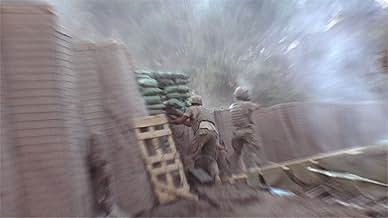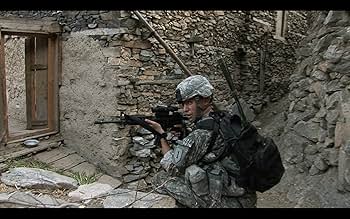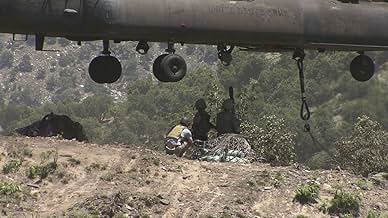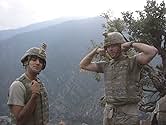CALIFICACIÓN DE IMDb
6.7/10
4.2 k
TU CALIFICACIÓN
Agrega una trama en tu idiomaKorengal picks up where Restrepo (2010) left off--with the same men, in the same valley, with the same commanders--but presents a very different look at the experience of war.Korengal picks up where Restrepo (2010) left off--with the same men, in the same valley, with the same commanders--but presents a very different look at the experience of war.Korengal picks up where Restrepo (2010) left off--with the same men, in the same valley, with the same commanders--but presents a very different look at the experience of war.
- Premios
- 1 premio ganado en total
Opiniones destacadas
2010's Restrepo brought the Afghanistan War in to peoples' homes, bearing visceral shots and the raw emotion of modern warfare. Photojournalist Tim Heatherington and Sebastian Junger spent ten months with Combat Outpost (COP) Restrepo's "Battle Company" reaping an inordinate amount of footage. More footage than they could place into the first documentary. A year later, Heatherington would be dead; killed by shrapnel whilst covering the 2011 Libyan Civil War. Junger felt that the copious amount of footage leftover from Restrepo lent itself to another film. Thusly, Korengal, a companion film, was born.
Where the prior of the pair seemed aimed to illustrate Chris Hedge's 2002 quote, "The rush of battle is a potent and often lethal addiction, for war is a drug, one I ingested for many years," the latter shoots to exploit a more poignant and familial sense from the footage and interviews. For those familiar with Restrepo, do not expect anything revolutionary here. What you will be seeing is footage shot during the same time period (2007-2008) using the same equipment. That said, this is in no way a strike against the film. Junger fares well in his organization of the footage and new interviews. This is an altogether new narrative.
As a piece of war journalism, it stands out as a worthy companion piece to the first film, not only elaborating on notions explored in Restrepo's 93 minute running time, but introducing new and arguably more meaningful elements. Junger succeeds in revisiting their footage, and bringing freshness to what could have become a dull supercut of Restrepo's outtakes in another man's hands. It's a damn shame Heatherington wasn't around to see this complete vision of the creation he and Junger set out upon in 2007. These two pictures have set the standard for war journalism, and will hopefully usher in a new era of the discipline.
Where the prior of the pair seemed aimed to illustrate Chris Hedge's 2002 quote, "The rush of battle is a potent and often lethal addiction, for war is a drug, one I ingested for many years," the latter shoots to exploit a more poignant and familial sense from the footage and interviews. For those familiar with Restrepo, do not expect anything revolutionary here. What you will be seeing is footage shot during the same time period (2007-2008) using the same equipment. That said, this is in no way a strike against the film. Junger fares well in his organization of the footage and new interviews. This is an altogether new narrative.
As a piece of war journalism, it stands out as a worthy companion piece to the first film, not only elaborating on notions explored in Restrepo's 93 minute running time, but introducing new and arguably more meaningful elements. Junger succeeds in revisiting their footage, and bringing freshness to what could have become a dull supercut of Restrepo's outtakes in another man's hands. It's a damn shame Heatherington wasn't around to see this complete vision of the creation he and Junger set out upon in 2007. These two pictures have set the standard for war journalism, and will hopefully usher in a new era of the discipline.
Strangely unengaging documentary.
Korengal follows the lives of a company of US Army soldiers stationed at an outpost in Afghanistan in 2007-8. It is the sequel to Restrepo, which was nominated for a Best Documentary Oscar in 2011.
Maybe it is because I haven't seen Restrepo (yet), but this documentary just doesn't work for me. It doesn't do much wrong - there is a good mix of interviews and live action footage and there is a degree of conclusiveness to it all. Yet I wasn't engaged. The whole thing just seemed to plod along and I didn't feel any real affinity towards the soldiers.
There is also a large degree of gung-ho-ness and bravado, which is a bit off-putting. The movie doesn't feel balanced enough. Maybe that's the problem.
Korengal follows the lives of a company of US Army soldiers stationed at an outpost in Afghanistan in 2007-8. It is the sequel to Restrepo, which was nominated for a Best Documentary Oscar in 2011.
Maybe it is because I haven't seen Restrepo (yet), but this documentary just doesn't work for me. It doesn't do much wrong - there is a good mix of interviews and live action footage and there is a degree of conclusiveness to it all. Yet I wasn't engaged. The whole thing just seemed to plod along and I didn't feel any real affinity towards the soldiers.
There is also a large degree of gung-ho-ness and bravado, which is a bit off-putting. The movie doesn't feel balanced enough. Maybe that's the problem.
I just finished reviewing "The Hornet's Nest," another film by a father and son journalist team, and I explained how I wished it was more like "Restrepo" and "Korengal."
This follow-up film to Restrepo with the filmmakers embedding with the same platoon at the same OP was equally as engaging as the original, but focused more on the other parts of war that it didn't touch on in Restrepo. This film visited the more psychological part of warfare: the mind games each and every soldier struggles with, being so bored you'd rather be in a firefight just to pass the time, or going out on patrol looking for death because you don't care anymore whether you live or die etc. It's about each soldier's individual psychological struggles and how each deals with them in their own ways.
As a journalist, I really appreciated how this film focused entirely on the soldiers and the war, letting the soldiers tell the viewer everything, rather than the filmmakers getting on-camera and explaining it to the viewer. That is where my critique of "The Hornet's Nest" was rather scathing. That film got in the way of itself, cutting back to the journalists constantly so they could get face time with the audience. I'd rather see it done how these filmmakers approached this film and Restrepo, asking the soldiers the questions and letting them answer — letting them supply the narrative, exclusively.
This film is a must-see follow-up to Restrepo as they re-embed with the same group of familiar faces for another deployment in the Korengal.
This follow-up film to Restrepo with the filmmakers embedding with the same platoon at the same OP was equally as engaging as the original, but focused more on the other parts of war that it didn't touch on in Restrepo. This film visited the more psychological part of warfare: the mind games each and every soldier struggles with, being so bored you'd rather be in a firefight just to pass the time, or going out on patrol looking for death because you don't care anymore whether you live or die etc. It's about each soldier's individual psychological struggles and how each deals with them in their own ways.
As a journalist, I really appreciated how this film focused entirely on the soldiers and the war, letting the soldiers tell the viewer everything, rather than the filmmakers getting on-camera and explaining it to the viewer. That is where my critique of "The Hornet's Nest" was rather scathing. That film got in the way of itself, cutting back to the journalists constantly so they could get face time with the audience. I'd rather see it done how these filmmakers approached this film and Restrepo, asking the soldiers the questions and letting them answer — letting them supply the narrative, exclusively.
This film is a must-see follow-up to Restrepo as they re-embed with the same group of familiar faces for another deployment in the Korengal.
6FKDZ
Korengal is a follow up documentary to Restrepo that felt like a lesser continuation that it deserved to be. It wanders around too much with surface level subjects and does repeat some points we've heard or seen in Restrepo. Going back to Korengal valley still blows your mind with how intense and weird that position was. Shooting at distant targets almost everyday. Complete isolation. The mental games that are being played. It's a short fascinating look into a different world.
It makes you understand the guy that would jump back in right away. As we know from war, it's said to be incomparable to anything else in life. The constant fear of death, being surrounded by your brothers, seeing death, delivering it too. It's the most extreme thing you could do in this world.
That said, Korengal did less for me than Restrepo. And ended up feeling too surface level to care much about.
It makes you understand the guy that would jump back in right away. As we know from war, it's said to be incomparable to anything else in life. The constant fear of death, being surrounded by your brothers, seeing death, delivering it too. It's the most extreme thing you could do in this world.
That said, Korengal did less for me than Restrepo. And ended up feeling too surface level to care much about.
Director Sebastian Junger tries to add more depth to the documentary Restrepo he made with Tim Hetherington. In the meanwhile, Tim dies while filming in Misurata, Libya. This one delves more into the troops' feeling and the war's effectives on them. For me, it touches on too much of the same subject. It's the same place at the same time. Restrepo came earlier and feels more immediate. It was closer to the events and was more visceral. I appreciate the attempt to dive deeper into this world. I would suggest concentrating on one or two characters. It would allow the audience to truly track the development and the change in these troops over time. The footage may not be there but they could do interviews with some of these guys back home. It is eye opening to see everybody say that they rather be back in the Korengal valley. However the movie really needs the 'Where are they now?' segments.
¿Sabías que…?
- Citas
LaMonta Caldwell: It's just a valley. It's a valley that is if you look from high above, it looks like a quiet valley.
- ConexionesFollows Restrepo (2010)
- Bandas sonorasEnjoying Firefights
by Marty Beller
Selecciones populares
Inicia sesión para calificar y agrega a la lista de videos para obtener recomendaciones personalizadas
- How long is Korengal?Con tecnología de Alexa
Detalles
Taquilla
- Total en EE. UU. y Canadá
- USD 101,310
- Fin de semana de estreno en EE. UU. y Canadá
- USD 14,630
- 1 jun 2014
- Total a nivel mundial
- USD 101,310
- Tiempo de ejecución1 hora 24 minutos
- Color
Contribuir a esta página
Sugiere una edición o agrega el contenido que falta

Principales brechas de datos
By what name was Korengal (2014) officially released in India in English?
Responda






















